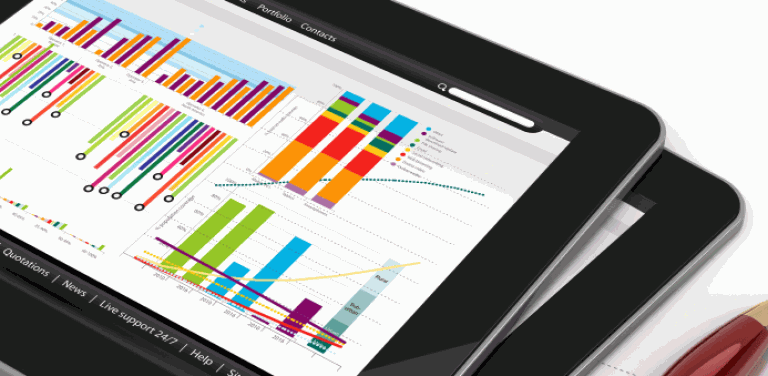One of the great things about real estate agents is they tend to be very tech-savvy. They know they need a website. They know they need a solid online presence, amazing SEO and extensive web marketing to generate a decent flow of leads in this day and age.
That said, if you’re a real estate agent, you know you’ve got some serious online competition. So how do you push past all the other 'inferior' agent sites and land your (clearly better) website on the first page of Google?
Biggest Mistake #1: Real Estate Agents Who Use a One-size-fits-all Real Estate Template or “Real Estate Web Development” Company / Software
Meet John. John was a prominent real estate agent specializing in the High Park – Parkdale areas of Toronto. After 35 years in the business, he noticed most real estate clients were doing most of their research online when it came to buying and selling their homes. Younger and more tech-oriented agents were poaching clients in the area, and his future sales looked bleak if he didn’t get on board with “the whole web marketing thing.”
John knew he needed a website with MLS listings, lead gen tools, mortgage calculators, tons of information on real estate and all the bells and whistles he can dream up while he looks through some of the websites of his top competitors.
After some extensive research, John meets a freelance web designer. The designer promises to deliver all his bells and whistles plus more for only ~$1000 and $50/mo. John is thrilled.
The designer delivers exactly what he asked for plus more. A full-blown real estate website with tons of listings, tools, content and resources. John was happy, at first.
After 10 months, John realizes something isn’t right. He did not receive a single lead from his website.
He analyzes the website more closely. The home search function was too generic. Everyone used the same MLS search. We need to customize it to our neighborhoods and search styles, he thought. But the web developer was not able to customize the listings because they were in an iFrame (a 3rd party component coming from another website).
Digging deeper, a closer look at the site showed the whole thing was a fake. The same “website” was used for 10,000 different real estate agents across North America.
Imagine selling the same website and content to multiple real estate agents and just swapping their names, photos, contact info and listing locations? A 5-minute job, for $1000.
Guess what? This scenario is so common, tons of web development companies have created real estate templates / software solely for this purpose!
Biggest Mistake #2: Real Estate Agents Who Sell Their Soul for a 100% Custom Real Estate Website
Meet Kiram. Kiram was onto his 4th try building his real estate website for beachfront luxury condos in Florida. Kiram had had enough. After hearing from countless web developers that he needed to use Joomla or WordPress or [insert whatever proprietary Real Estate web software company] with this plugin or that extension, he was sick of getting no results.
Kiram met in person with a professional web development agency that would deliver exactly what he wanted, down to every single nitty gritty detail. They even had a waterfall and giant fish tank in their high-tech fancy little lobby, so you know they mean business. Finally, for the humble price of just an arm, a leg and a pinkie toe, Kiram received the website of his dreams.
That was until... all the maintenance work started.
What, you think you can just build a website and call it a day? At first, he wanted to make a few changes to the content. The website had a CMS, but it was proprietary and difficult to use since only a small team was supporting it. Fair enough, it’s custom.
But later he wanted to add a few extra custom pages and make some additional banner changes. He was not prepared for the quotes he received when he fell out of his chair.
Don’t like it? Find another developer. Oh, except you can’t, your website is 100% custom and using a proprietary CMS. Good luck finding another custom developer who wants to deal with another custom developer’s work. Your original custom web developer will be the one calling the shots from now on, dictating ongoing terms and prices. And what are the chances of stumbling across a benevolent dictator?
These two cases illustrate two of the most common issues real estate agents (and many other business owners) have to deal with when getting a website. So how can we avoid being the next victim? Well, there are a few lessons we can learn.
1) Focus on original, quality content above all
Before you hire a web designer or web developer to do anything, figure out your content first. A web designer is not a real estate expert. A web designer should not be “writing” articles on buying & selling homes. That job is for the real estate agent or professional content writer. Take the time to carve out some under-exploited niches in your industry, gather some long tail keywords and prepare some proper landing page content. This is the main factor on your website that’s going to help rank your site, not your fancy widgets and calculators.
In fact, even if your website fails in some ways, good content in your blog / resources sections can usually offset that. Let’s say you had the unfortunate experience of ending up with an ugly website with broken widgets and crummy listings search experience. If you have a high-quality blog, with genuinely helpful advice to buyers and sellers and an active readership, the “ugly website part” is overlooked by many. You can still generate high-quality real estate leads so long as your content is sound and you look like you know what you’re talking about.
2) Use an open source content management system (CMS)
If you want to maximize ROI on your website, you have to strike a balance between building it from scratch and using a cookie cutter template. Obviously, you don’t want a mass-produced website straight off the assembly line, but you also don’t want to hire a totally custom web developer at $300/hr who’s going to write 100,000 pages of code and completely own you. There’s a profitable middle ground where conditions are just right.
An open source content management system allows you to manage your own website content and updates 10x more easily, effectively and quickly, with tons of community support.
Different mid-range developers are going to promote different systems, usually the systems they have the most experience in. We can’t avoid bias. However, if it’s open source (like WordPress or Joomla), you’re safe to switch developers, update easily, change content easily and manage everything at a great price relative to anything custom.
3) Use an ultra flexible & customizable (real estate) theme that’s highly rated
Before you select that random real estate theme you found somewhere online because it looks “cool,” bear in mind, most of them are actually cheap and flimsy. Fancy demos reel customers in, but then when you try to customize them, components start to fall apart or the framework is too rigid. Here’s a guide for selecting the right theme for your business; the same points apply to real estate.
4) Integrate organic IDX or RETS / MLS listings & search
It’s not a big deal to showcase some sort of MLS listings / widgets on your website. Unfortunately, most real estate agents have no idea how to differentiate between useless feeds that use 3rd party data or iFrames, and custom IDX solutions that are tailored to a specific type of real estate market, buyer or business goal. The former solution will cheapen your site, while the latter will give you some real value and SEO boost in addition to the content you already have.
Then there’s the issue of filtering through all the garbage plugins, obsolete extensions, and unsupported mumbo jumbo. Fortunately, your work is easy because there really aren’t that many powerful IDX solutions to choose from.
Below are the best, cost-effective WordPress compatible real estate IDX solutions in North America (US and Canada) for Real Estate Agents in 2016:
WPL Real Estate (variant pricing & customization)
Manage property listings, RETS / IDX / VOW real estate options and scalable features. Support for all RETS based MLS providers in North America.
IDX Broker (Starting at $100 set-up + $40/mo)
IMPress for IDX Broker provides a tremendous amount of flexibility and also a very high level of customization.
5) If you want SEO value from your Listings, you need to host the IDX feed ON your website and you need to customize the feed
Here’s a dirty little way to check if your competitor or web developer is doing it right. Go to the listings or search page of any real estate agent website and right-click on a random image from the IDX listings feed, inspect the element or just click “open image in new window.” What do you see in the URL? If you’re still technically on the same website, it’s good; they own that content. If it’s redirecting to some 3rd party domain, it’s bad; they’re not getting any SEO value from the listings.
Here’s another nugget of wisdom. You shouldn’t just dump the MLS data onto your website in any default format since another website is probably using that same format. Don’t forget, you’re competing with other agents for maximum SEO potential, you need to present the data in a unique and valuable way (even if you’re rehashing content that’s already on Zillow, Realtor, & MCLS). Find a way to present the content in a unique and meaningful way that adds value to your niche.
6) Understand that if you’re on a budget, your listings should not be the focal point of your website, they should be supplementary to your content
Let's keep it real for a moment, if you're a single real estate agent or small team, you're not going to be competing directly with Zillow anytime soon. There's no point in trying to design an inferior version of Zillow on a domain that no one's ever heard of. Just ask the 2 million+ real estate agents who are stuck on the second page of Google and beyond.
While some realtors have managed to present listings in such a unique, meaningful and custom way that people will forgo Zillow or MCLS to view the listings of one particular real estate agency, let’s be honest, MOST real estate searchers will go straight to one of the top 3 real estate websites (and now Apps) for real estate listings.
What tends to generate the best results for small business real estate agents is specialization. Become an expert in some area of real estate and establish yourself as an industry leader in that field. This is the biggest weakness of big corporations and you can use it to your advantage.
The topics you can blog about are endless and interesting. You're lucky your not in some boring niche like accounting.. (just kidding accountants, accounting is so fun!) Discuss real estate trends, economics, investments, opportunities, flips and/or neighbourhoods. Build a community around your expertise, build trust, answer FAQs, publish success stories etc. This is where WordPress comes in handy.
In Sum
Small business real estate agent websites are not that complicated if you're informed of the following:



